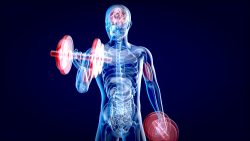 Recent findings show that exercise benefits not only the body but also the mind. In fact, a new publication in the journal Neuroscience points out that exercise has an even more profound impact on brain health than previously thought. This research investigates how chemicals produced by muscles during movement lead to neuronal development in the brain, specifically affecting the hippocampus areas responsible for long-term memory storage.
Recent findings show that exercise benefits not only the body but also the mind. In fact, a new publication in the journal Neuroscience points out that exercise has an even more profound impact on brain health than previously thought. This research investigates how chemicals produced by muscles during movement lead to neuronal development in the brain, specifically affecting the hippocampus areas responsible for long-term memory storage.
These findings demonstrate that the release of chemical signals from muscle cells during exercise has a profound effect on neurons. This novel insight sheds light on the deeper molecular mechanisms through which exercise can support a healthy brain and improve mood and cognition.
This research delves into the impact of muscle chemicals on different parts of the brain, most notably, the neurons within the hippocampus. Through exercising, the cognitive health of an individual is known to improve since the neurons within the brain undergo a transformation within the hippocampus. The findings shed light on how the brain responds to exercise, suggesting that chemical signals from contracting muscles may activate a signaling pathway that enhances cognitive function.
The study provides fresh insights into how chemical signals from contracted muscles, examined in vitro, can hasten the maturation process of hippocampal neurons and also promote the formulation of neuronal networks. Moreover, the study underscores the crucial role of astrocytes, specialized cells that surround and support neurons in the brain, in managing the growth of hippocampal neuronal networks. By emphasizing the role of astrocytes in controlling neuronal activity, which is often overlooked in brain research, the study implies that developing treatments for neurological diseases may entail taking into account not only neurons but also astrocytes.
The study’s implications extend to potential therapeutic uses for neurological disorders and the development of exercise regimens designed to optimize cognitive health. The critical role of astrocytes in mediating the effects of exercise on hippocampal neurons highlights the importance of considering this interaction in future research endeavors. Overall, this study provides valuable insights into the communication between muscles, astrocytes, and neurons, advancing our understanding of the brain’s response to exercise and its potential applications for neurological health.
To view the original scientific study click below:
Astrocyte-mediated Transduction of Muscle Fiber Contractions Synchronizes Hippocampal Neuronal Network Development





